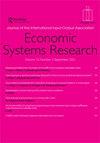Peasant farmers and pandemics: the role of seasonality and labor-leisure trade-off decisions in economy-wide models
IF 1.6
4区 经济学
Q2 ECONOMICS
引用次数: 1
Abstract
Pandemics attack the primary asset (labor) of peasant households and the rural poor. Peasant households must simultaneously allocate labor between farm and household activities, where the demand for agricultural labor is seasonal, which limits intra-temporal substitution, without perfect foresight. A pandemic reduces the supply of labor, through deaths and morbidity, with the scale of reductions in labor supply depending on the seasons in which a pandemic occurs. The analyses, using a recursive dynamic economy-wide model for Bhutan, demonstrate that outbreaks in high labor demand seasons cause increases in wage rates almost three times as high as for outbreaks in low labor demand seasons. Increases in wage rates induce peasant households to reallocate labor time between farm and household activities through the labor-leisure trade-off mechanism. Such changes in the allocation of labor time are important elements of peasants’ mitigation responses, and can reduce the negative economic implications of a pandemic.农民和流行病:季节性和劳动闲暇权衡决策在全经济模型中的作用
流行病攻击农民家庭的主要资产(劳动力)和农村贫困人口。农户必须在农场和家庭活动之间同时配置劳动力,而农业劳动力的需求是季节性的,这限制了时间内的替代,没有完美的预见。大流行通过死亡和发病率减少劳动力供应,劳动力供应减少的规模取决于大流行发生的季节。对不丹使用递归动态全经济模型进行的分析表明,在劳动力需求旺盛季节爆发疫情导致的工资率增长几乎是劳动力需求低迷季节爆发疫情的三倍。工资率的提高促使农户通过劳动-闲暇权衡机制在农事和家庭活动之间重新配置劳动时间。劳动时间分配的这种变化是农民缓解措施的重要组成部分,可以减少大流行对经济的负面影响。
本文章由计算机程序翻译,如有差异,请以英文原文为准。
求助全文
约1分钟内获得全文
求助全文
来源期刊

Economic Systems Research
ECONOMICS-
CiteScore
5.60
自引率
4.00%
发文量
17
期刊介绍:
Economic Systems Research is a double blind peer-reviewed scientific journal dedicated to the furtherance of theoretical and factual knowledge about economic systems, structures and processes, and their change through time and space, at the subnational, national and international level. The journal contains sensible, matter-of-fact tools and data for modelling, policy analysis, planning and decision making in large economic environments. It promotes understanding in economic thinking and between theoretical schools of East and West, North and South.
 求助内容:
求助内容: 应助结果提醒方式:
应助结果提醒方式:


